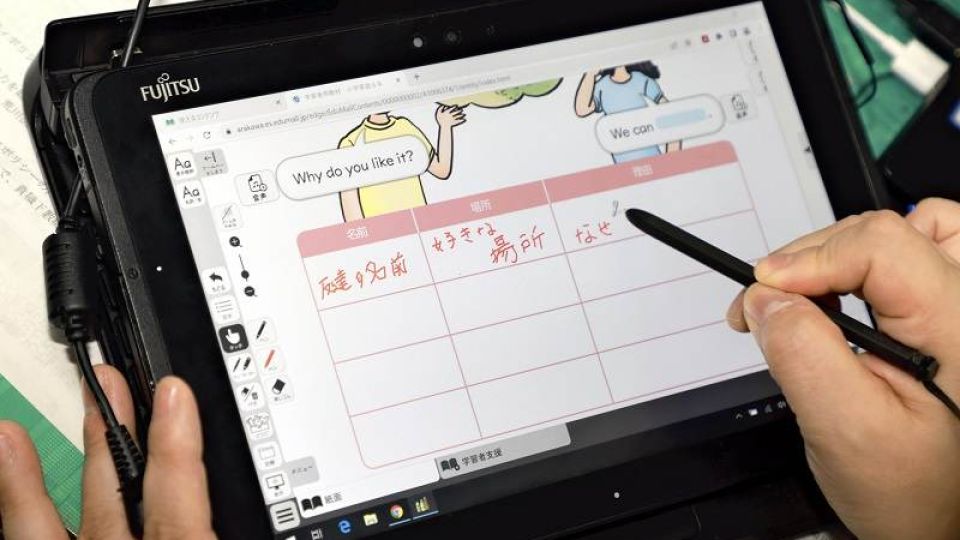September 8, 2022
TOKYO – The education ministry has decided to fully introduce digital textbooks for English in elementary and junior high schools from the 2024 school year.
Although it may also adopt digital textbooks for math in the 2025 school year or later, the comprehensive introduction of digital textbooks once envisioned for 2024 will be realized only for English in that year, with digital textbooks to be used in combination with paper textbooks.
As doubts about digital textbooks’ educational effectiveness and health effects have not been dispelled, the introduction of digital textbooks is to be limited initially.
“It’s helpful that students can listen to native speakers’ pronunciation at their own pace.”
This is what a sixth-grade teacher at Daiichi Nippori Elementary School in Arakawa Ward, Tokyo, said when asked for her thoughts after using a digital English textbook.
When students touch the screen with their finger or a stylus, they can hear the text read aloud.
The students can now listen to accurate pronunciations as many times as they like and learn according to their own level of understanding, instead of learning the same content together by looking at a blackboard or textbook.
Digital textbook screens display the same content as paper textbooks. But they also have functions such as magnification and kana readings of kanji. The sentences can also be read aloud, which is beneficial for students with disabilities and those for whom Japanese is a second language.
On Aug. 25, the Education, Culture, Sports, Science and Technology Ministry compiled a proposal for a phased introduction of digital textbooks, starting with English language textbooks, which was approved by a working group of the Central Council for Education. The ministry will consider introducing digital textbooks for math in the 2025 school year or later, as they make it easy to draw figures and graphs. The plan is to use a digital version in combination with paper textbooks for these subjects, too.
Balancing digital, paper
The ministry presented a proposal on the same day, stating that “an environment is needed in which both digital and paper textbooks are available.” The ministry continues to place importance on paper textbooks.
In an experiment conducted by the ministry, involving about 40% of elementary and junior high schools in the 2021 school year, middle- and upper-grade students at elementary schools and junior high school students were asked about the ease of using digital and paper textbooks.
For digital textbooks, the most common responses were “easy to gather various types of information,” and “easy to look at diagrams and pictures.” For paper textbooks, they were “easy to write in,” and “easy to save what we have learned.”
A study by Prof. Hirohito Shibata of Gunma University, who specializes in cognitive science and has conducted comparative research on the difference between paper textbooks and digital terminals, found that the use of paper textbooks was more efficient than digital ones in such activities as “flipping back and forth between pages,” “comparing materials,” and “searching for answers from manuals.”
When participants in an experiment were asked to find discrepancies among multiple documents, they did so 26% faster when using paper textbooks than when using personal computers, and they were 11% more likely to find discrepancies. In a search for a specified photo from a photo album, they were 30% faster when using paper textbooks than when tablet terminals were used.
“It is too early for students to use only digital textbooks,” Shibata said. “It is appropriate to use both paper and digital textbooks based on their characteristics.”
Glitches and bugs
Even when used in combination with paper textbooks, digital textbooks still have problems.
The ministry expects the introduction of digital textbooks to improve students’ academic performance, but so far no clear results have shown digital textbooks to be superior to paper in that regard.
Some studies even suggest that digital textbooks may lead to a decline in academic achievement. The Organization for Economic Cooperation and Development (OECD) analyzed the results of PISA (Programme for International Student Assessment) 2012 and found that schools that used computers often had lower reading comprehension scores than those that did not.
There are also concerns about the impact on students’ health. According to a ministry survey on the fiscal 2021 demonstration project, 20% to 40% of students felt pain or fatigue in their eyes, neck and shoulders after class.
Hardware trouble and communication failures were also frequent issues. In the same survey, many teachers reported inconveniences such as “freezing or dealing with error messages” (48.6%), and more than 50% of the teachers answered that there were weeks when they “did not use digital textbooks at all.”
Beyond English and math
The introduction of digital textbooks for more subjects, after English in the 2024 school year and math in or after the 2025 school year, is to be considered going forward.
The Courses of Study, which form the basis for school classes and textbooks, are revised every 10 years, with the next revision expected around 2027. There is a possibility that digitization will be further promoted with the revision, but increasing the number of subjects will bring additional costs. The issue of who should pay for upgrading the terminals, which are expected to have a lifespan of about five years, has yet to be determined.
Prof. Fujio Omori of Tohoku University, who specializes in education policy, commented: “Scientific verification of the effects on learning, not to mention health effects, is necessary. Compulsory education should be mainly paper-based, and digital textbooks should play only a supplementary role.”

